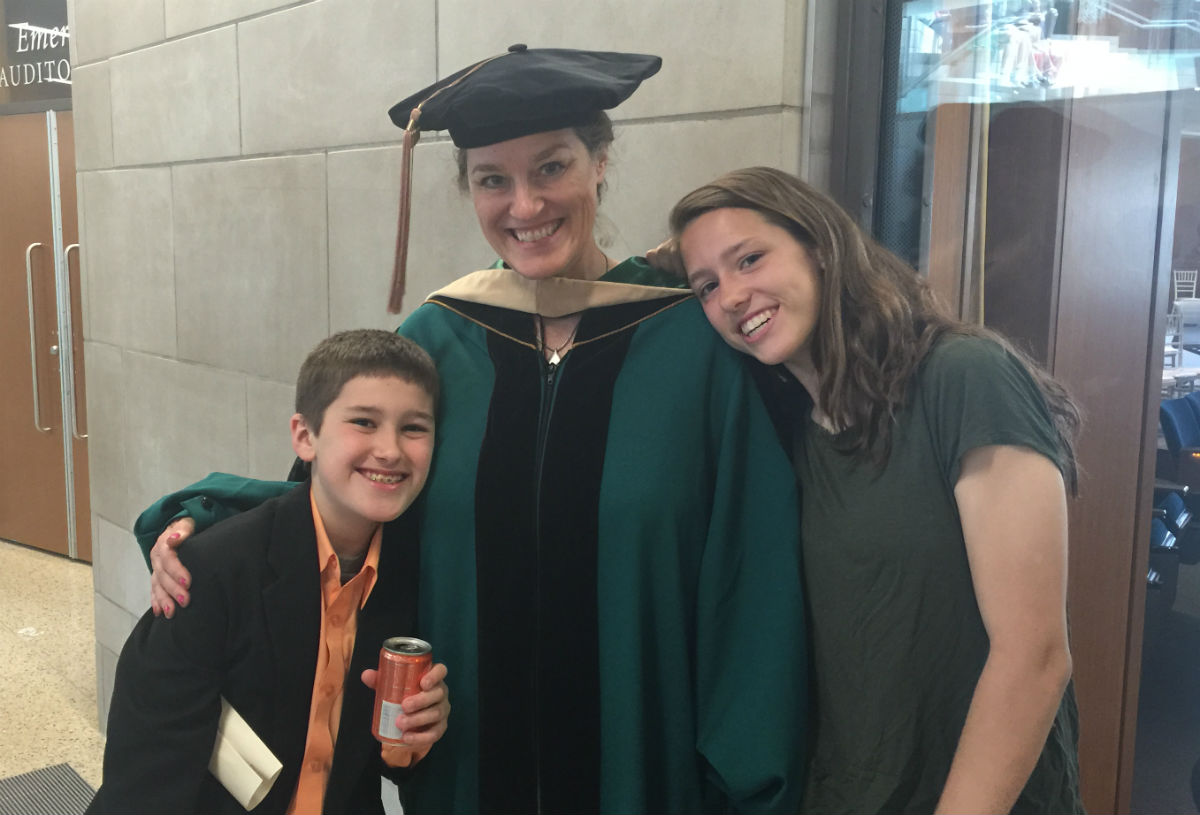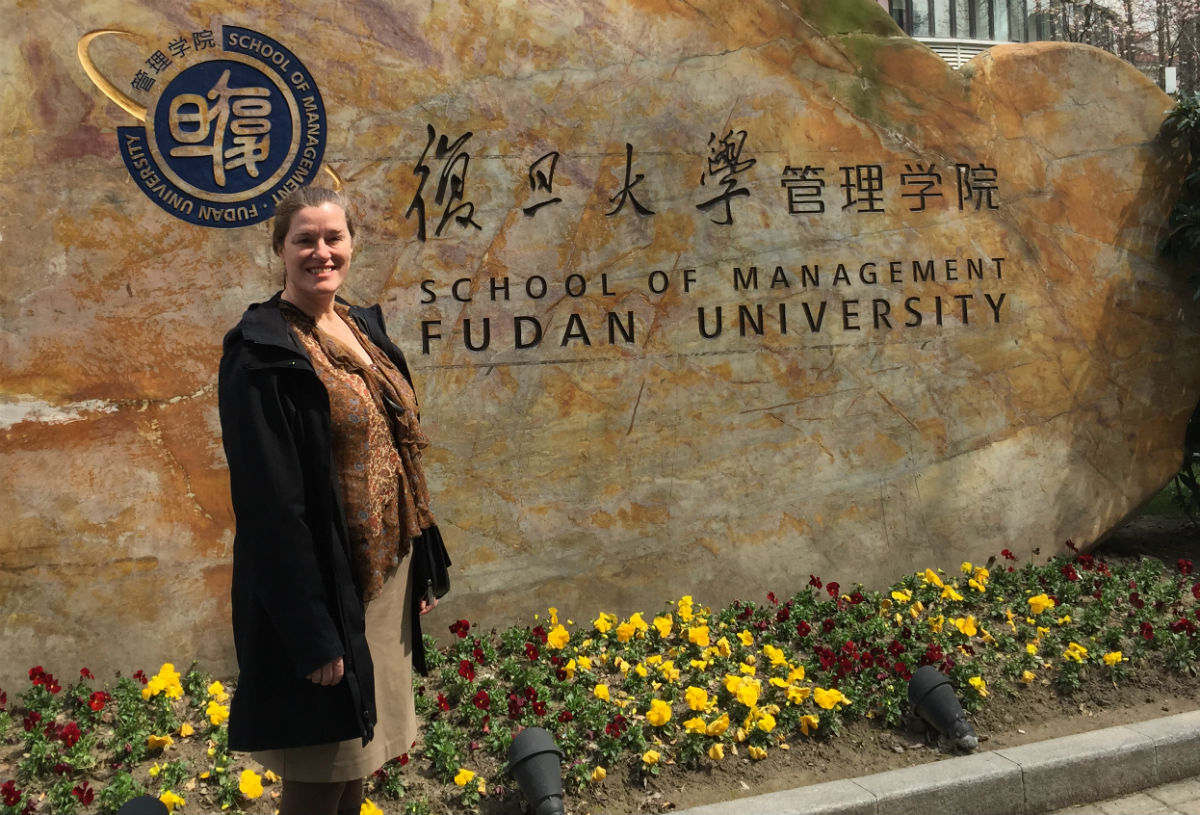How I could reward myself with an Executive MBA
- April 10, 2018
- By Guest Author
- 4 minute read

Tanya Yatzeck, EMBA 43, is a project manager in continuous improvement at Spire Inc. She wrote the following for the Olin Blog.
I was already an educated person. I had a master’s degree in the humanities. I had experience. My career—IT project management—was established. I remember thinking, “I’ve had enough school. I know what I need to know.”
The problem was, I was dissatisfied with my career. Not really at home in IT, but dependent on my IT income, I didn’t know how to do something else without leading to bankruptcy. I started talking to people I knew and respected about this problem.
A friend suggested talking to Frans VanOudenallen, executive career coach. Frans has an office at Olin. He’s associated with EMBA, although that’s not the conversation we had. When I visited him, we talked about my job dissatisfaction and what we could do about it.
It didn’t occur to me that school might be a means to address the problem. I appreciated the conversation, went home, and thought about it.

I worked for Washington University at the time; the post-graduate programs host semiannual informational luncheons for staff members. By the time I returned to work gave it more thought, I’d been bitten. The conversation with Frans and the luncheon made me feel like I had something within my grasp, although I couldn’t put my finger on it. I asked Frans for a contact with EMBA. He put me in touch with Edie Varley.
I first met Edie for mid-afternoon coffee at Kaldi’s in Clayton. She soon got to the heart of my issues. Before I knew it, I was describing my worst work nightmares and listening to her explain that I didn’t have to put up with it.
Persuaded by a force of nature
Edie’s title, director of discernment, is a product of her unique approach: Helping potential students decide whether the program is right for them.
“It’s not recruiting. I’m not selling anything here,” she said. “It’s a pound of flesh and it’s a chunk of change, and so together, we get to the heart and the root of it.”
Meanwhile, I had teenagers approaching college age—five of them. I thought it was selfish to start a program when it was their turn, not to mention the time commitment and balance of responsibilities between my husband and me.
I knew WashU might sponsor my degree, but I hadn’t asked yet. I didn’t know what they would say if I expressed a desire to do it. What if they said no? And I didn’t want to give up vacation time for classes.
Edie and I spoke several times. Talking to Edie means having the most intense, poetic, maddening, and beautiful conversation you’ve ever had, every time. Yet, when the phone would ring in those next days and weeks, sometimes I didn’t want to answer.
She challenged me to stand up for myself, to become my best self. She didn’t want me to give up and she wasn’t giving up on me. Edie said follow-up calls with prospects are the most challenging part of her job.
“When they don’t return emails and they don’t return phone calls, they fail to realize that their brand and their reputation is always speaking,” she said. “Somewhere, they stopped seeing me as a guide. They’ve turned me into a vendor selling them something.”
Having the ‘grown up’ conversations
Deep down, I was so touched by Edie’s passion, I took the next steps: an information session with executives and lunch with students. A doctor from the WashU medical school talked about how the program allowed him to break off a piece of his job and concentrate on it as a startup.
He got married during the program and took his wife on the trip to China. He got funding from his department by telling them, “I’m going to do this.” I couldn’t see myself doing that and being successful at getting funding, but I liked the idea.
Sometime around my first meeting with Edie, I broke my leg. Though she still encouraged me to join the next cohort, I decided to slow down. I needed time to heal, prepare, and talk to my leadership about the opportunity.
Edie had spoken about the “grown up” conversations required to ask for what you want, so with that, I approached the director of my department with the request. I expected her to say no. I didn’t feel I was a valued enough employee to warrant support in this endeavor. But by this point, I wanted it so badly, I feared I’d have to quit if they refused.
She didn’t. On the contrary, she laid out the steps to make it happen. I would have to use my vacation. They would sponsor me. By that time, I thought I’d be crazy to turn down a free MBA over vacation time. Just like that, I had had the grown up conversation that would change my life. I started the next September.
Edie says the reward for her work is the people who describe the great things that have happened to them because of the EMBA program.
“You’re living the dream. You decided to face your fears and do it anyway,” she said. “That is a daily reward for me: When I see them live up to the fullness of their own promise and help other people do it, too.”
This is all true. So, when I talk to anyone considering the program, I tell them to do it. And I tell them to talk to Edie.
Pictured above: Cameron McKenzie, the author’s son, the author herself, and her daughter Maya McKenzie at the author’s EMBA graduation in May 2015.
Media inquiries
For assistance with media inquiries and to find faculty experts, please contact Washington University Marketing & Communications.
Monday–Friday, 8:30 to 5 p.m.
Sara Savat
Senior News Director, Business and Social Sciences
